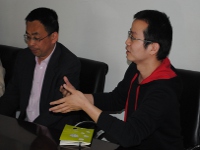Registration
Thank you!
You will receive an email confirming your registration.
IMGXYZ3477IMGZYXThe Carnegie-Tsinghua Center for Global Policy and Science of International Politics hosted a joint conference to discuss the evolution of relationships between China and the rest of East Asia. Carnegie-Tsinghua Resident Scholars Sun Xuefeng and Chen Qi moderated this event.
Ancient History
- Tribute: In ancient East Asia, China’s neighbors submitted tribute to China’s rulers in return for protection, participants said. However, the discussants different on the significance of this tributary system to the evolution of East Asian order. Zhou Fangyin of the Institute of Asia-Pacific Studies, Chinese Academy of Social Sciences (CASS), suggested that given the longevity of this system, it should be analyzed from both a strategic and political perspective. While considerable research has been done on the political side of the tributary routes and procedures, he contended that more strategic analysis needs to be done.
- A Self-Destructive Policy of Pacification: Zhou suggested that game theory can help scholars understand the stability of the central dynasty’s diplomacy through its interactions with neighboring countries. He posited four scenarios that reflect such interactions:
- Peaceful Policy and Submission: In this scenario, China’s rulers adopt a peaceful policy toward its neighbors, who submit to that policy.
- Peaceful Policy and Hostility: In this correlary, China’s adoption of a peaceful policy toward its neighbors is met with hostility.
- Conquer and Submission: In this scenario, China conquers its neighbors, who submit to Chinese rule.
- Conquer and Hostility: In this final scenario, China conquers its neighbors, who react with hostility.
- Peaceful Policy and Submission: In this scenario, China’s rulers adopt a peaceful policy toward its neighbors, who submit to that policy.
- Replacing “Tributary System” with “Tributary Regulation”: Professor Zhang Feng of Tsinghua University suggested that ancient East Asia had what might be called an international community, although that community might not match the Western definition of the term. This community was characterized by normal interactions among members through marriage, warfare, trade, and diplomacy. As a result, Zheng suggested that it might be more appropriate to describe the ‘tributary system’ as ‘tributary regulation.’
- Limits to Tribute: Renmin University’s Shi Yinhong added that the tributary system was not applicable for all interstate relations in East Asia in antiquity. For example, the northern Huns did not pay tribute to the Chinese.
- Reality or Symbol: The concept of the tributary system and its dominance have been overstated, giving an inaccurate depiction of East Asian relations, argued Luo Zhitian of Peking University. Tribute, or yi xia, was primarily a symbolic relationship of submission and respect and was not strictly enforced, he said. It was rather a symbol of the dynasty’s validity, and tribute was ultimately a form of cultural, rather than economic or political, interaction.
Recent History
- Cold War Politics in East Asia: During the Cold War, conflicts in East Asia stemmed from the opposing ideologies and influences of the West and the Soviet Union, argued Wang Dong of Peking University. During this time, East Asia also saw a rise in the number of nations gaining independence, which caused further conflict between the United States and the Soviet Union as each sought to extend its influence in the region.
- An End to the Cold War: East Asia conflicts stemming from the Cold War were undermined with the creation of ASEAN, a regional organization comprised only of Asian countries, in 1967. Since the United States and China had formal diplomatic relations after 1972, and Beijing and Moscow did not, Shi argued that the Cold War in East Asia thus essentially ended in 1972.
- Two East Asian Orders: Liu Jianping from the Communication University of China added that after the end of the Second World War, there was a shift in the regional order. As a result, Liu argued that two East Asian orders existed: one dominated by China, the other by the United States through Japan.
- Reconstructing the Regional System: After the end of the Cold War, it was necessary to rebuild regional relations in East Asia. However, this proved difficult, Shi said. The rebuilding process was inefficient, weakened by uneven development within the region that led to long-term structural conflicts. These conflicts increased tensions between the United States and China. Shi suggested that one way to help ease tensions regionally would be for East Asian nations to use the opportunities for communication within the international institutions instead of relying on bilateral dialogues.
- Post-Financial Crisis Cooperation: Due to the current economic situations in both the United States and Europe, East Asian regional development is likely to be hindered, argued Xu Jin of CASS. As a result, China’s economic rise will not be matched by any other Asian nations for several more years. China’s policy of “promoting political cooperation by economic cooperation” may not have the power to compete with Japan and South Korea, as both nations are under U.S. influence , Xu added
Discussants: Shi Yinhong, Luo Zhitian, Zhou Fangyin, Liu Jianping, Zhai Kun, Xu Jin, Wang Dong, Zhang Feng
